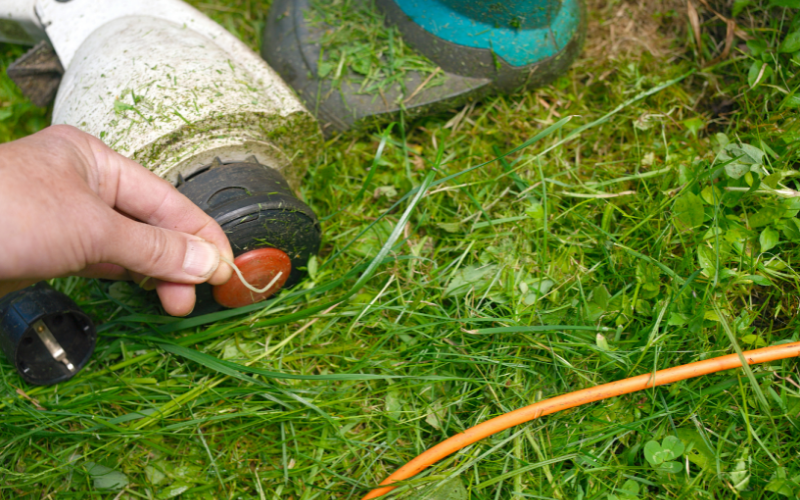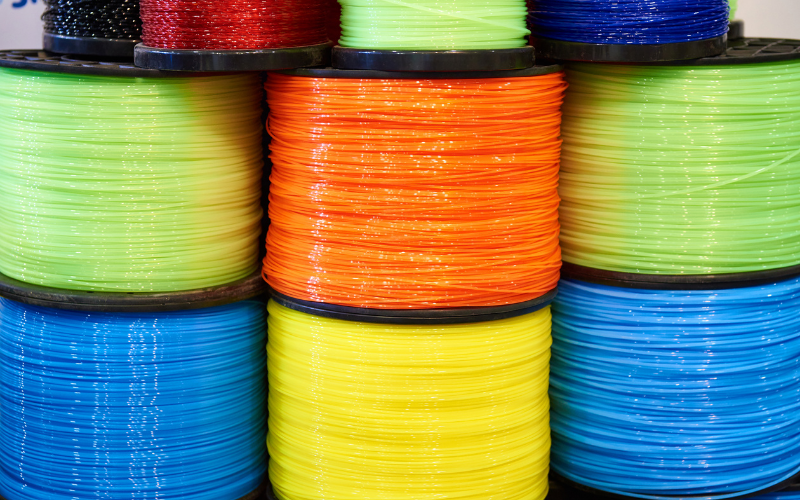Yard tools need looking after, maintaining, and eventually replacing. That’s just the way it is. String trimmers are fairly simple in their design compared to other types of power tools, but there’s one part of a trimmer that a lot of people have trouble with. I am of course talking about the line. A few years ago I was replacing my line too often it was driving me crazy. “Why does my trimmer line keep breaking?” I asked at a local store. And they actually gave me some really good advice. I implemented it and have never looked back.
The most common reasons that a trimmer line keeps breaking include poor quality trimmer line, incorrect thickness of line, not being careful around hard surfaces and old line being used.

Why Does My Trimmer Line Keep Breaking: The Most Common Causes
Most of us just want to get on with the job when we’ve got yard work to do. So stopping to replace the trimmer line is a real pain in the butt. It’s going to break from time to time. That’s just normal wear and tear. But if you notice the line is breaking frequently, look at the list below, as one of these factors is likely the reason.
You’re Using Poor Quality Line
You might now be finding out why the line you bought was so cheap. Given that your trimmer line is so important in terms of the quality of cut your trimmer delivers, and the fact that it’s really subjected to quite a beating on every use, you want to make sure it’s good quality.
So if you’re not using a line produced by a reputable brand, this is likely the first thing I would try. Head to the store and pick some new line up, made by a better manufacturer.
There are lots of different types of trimmer line available. In fact, I wrote a piece comparing twisted trimmer line vs round vs square. Round lines tend to last longer than square or twisted line. At least that’s what I’ve experienced.

Your Line is Too Lightweight
There are different thicknesses of trimmer line from 0.05 inches all the way up to .2 inches. If you’re using a lightweight line and are trimming close to hardscape features like patios, driveways, paths, etc, this could explain why your line is breaking so frequently. It just isn’t designed for that kind of use.
Generally speaking, the thicker the line, the more resistant it will be. So have a look at the manufacturer’s recommendations on line thickness, and see if you’re currently using a line thickness on the lower end of their recommended range. If you are, buy a thicker line and use that.
But be careful to not go thicker than their recommended max, as thicker lines require more power to be effective, and you don’t want to exceed your trimmer’s capacity otherwise the results will be poor in terms of cutting performance.
Getting Too Close to Hard Surfaces
It goes without saying that the line is far more likely to break if it is frequently coming into contact with hard surfaces. Things such as patios, walls and stones put the line under a lot more stress than grass does, and consequently, the line isn’t going to last as long.
If you think this could be why your trimmer line keeps breaking so frequently, it might be wise to make some slight tweaks to the way in which you use your trimmer. For me, the absolute key here is to slow right down when you’re approaching these harder surfaces. I know you likely want to zip right around your yard and get done as quickly as possible, but the faster you go, the harder it is to control the trimmer head with precision.
If you move the trimmer head slowly in these areas, it is possible to get right up to the edges with very little contact between these objects and the trimmer line.
It’s Old Line
Was the spool of trimmer line you’re currently using left lying around in your shed or garage for several years before you started using it? This is a big no-no.
Trimmer line can get extremely brittle as it ages, particularly if you left it exposed to the sun at any point. If this is the reason your trimmer line keeps breaking, it’ll be very obvious. It’ll barely have any resistance at all and will break off with very little use.
A good rule of thumb is to not use any trimmer line that you’ve had for 5 years or longer. And maybe that’s being a bit too conservative. Before you throw it away, you could try soaking the trimmer line in water. Some people swear by this technique.
Expecting Too Much of Your Trimmer
I see this quite a lot. People using a pretty cheap trimmer to try and tackle an overgrown jungle. It’s just not realistic, and it’s just asking for your trimmer line to break with regularity.
So if your line is breaking more often than you think it should be, take a step back for a minute and think about what you’re doing with your trimmer. Are you pitting it against gigantic weeds and 4-foot grass? These are tough, tough conditions. If you’ve got a powerful trimmer and thick line, it’s doable. But if you’ve just got a little residential unit with some 0.065″ line, you should be expecting it to break – not asking why it’s breaking.
So be realistic with your equipment and assess whether you’re pushing it past its capabilities.
Strimmer Line Keeps Breaking: A Quick Recap
These are the 5 things that I’d personally look at if you’re trying to figure out why your strimmer line keeps breaking.
- Check the quality of the trimmer line you’re using.
- Check your trimmer line is thick enough.
- Be careful around hard surfaces.
- Make sure your line is not past its best (old).
- Make sure the trimmer line (+trimmer) is designed for the trimming you’re doing.
For me, it was #2 (+ partially #1 I guess). The line I was using was a little too thin for what I was doing. I went from a 0.065” line to a 0.095” line (of a slightly better brand) and that solved the problem. Breakages became far less frequent and trimming became far more enjoyable!


McGregor Strimmer I use:
Round lines break immediately.
Twist lines don’t.
Thanks for your help today I hope I get it right. I’m not one to know what I’m doing lol but I try
I have found that Trimmer line over a year old in water improves performance and then it does not break as bad. I recently bought another Ryobi ‘Expand it’ trimmer and found that they recommend both the .080 and .095 line for the trimmer.
Don’t throw away your old trimmer parts. I kept the old trimmer head parts from my Homelite trimmer and discovered that my original ‘Expand it’ trimmer head accepts the better trimmer metal shield and the metal trimmer tri blade so some of the time I just keep the metal tri blade on that head and the string trimmer on the other. I live on a small farm so I have even converted old 24 tooth carbide saw blades to use on the trimmer for some brush jobs.
Hello from the sub-tropical east coast of Australia.
Great summary of the two types. So agree with your observations. I went battery mower and edger and totally happy with that decision…quick and easy. No start-up problems, no fuel etc. I retained my trusty STIHL whipper snipper to get into corners and curved edging but it is still a hassle to get it going and weight. I also had so much problem with line snapping and was advised to use much thicker (orange square coloured) line and it can handle the raised decorative concrete edging without snapping. It just wears out! I gave up on spooled line years ago (jamming and too thin) and use two 150mm pieces of line, inserted into the vice-like grip of the machine’s head. However, to do the odd corner and underneath a decorative fence it wasn’t worth starting up the petrol snipper so when I read about battery snippers that used nylon blades I bought one ($A170, $US 140?). Yet to try it…more as a “clean-up” tool than any serious mowing.
Mowing the lawns used to be a “put it off for another day” because I had a corded edger (total pain) and old petrol mower (almost wrecked my back).
Now, with battery mower, edger, blower – so easy. Over and done with in less than an hour! And lawns look stunning.
Lawn maintenance has the same issues the world over but the older you get, the more you want efficient lightweight tools to do the job.
Cheers
Hi Richard,
I’ve heard trimmers called a lot of things, but “whipper snipper” is a first!
I’m happy to hear that electric garden tools are working out for you. It’s actually something I hear quite a lot from people who struggle with heavy old gas-powered tools and don’t want to give up yard work. Especially those tools that need a starter cord pulled repeatedly. I think that in the coming years, gas-powered equipment will be a thing of the past. California has already banned them and gone totally electric.
Good luck with your new tools.
Tom.